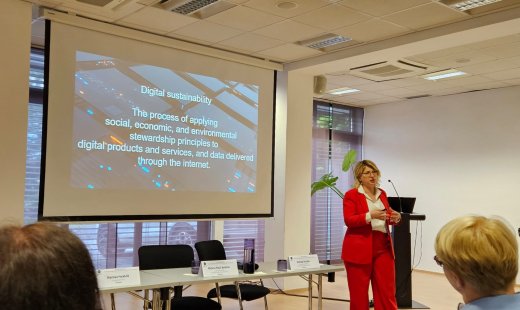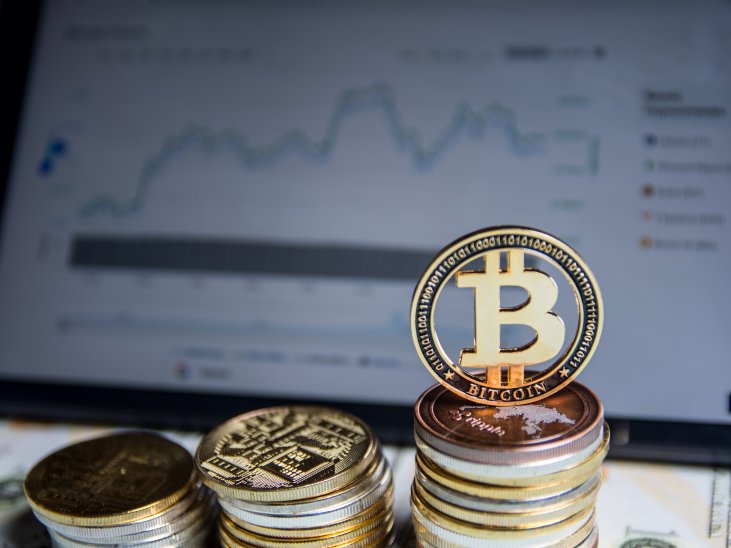Unleash innovation through digital sustainability

Last week, in the picturesque town of Bled, Slovenia, a transformative vision for the future was shared at a high-profile conference. Mariane ter Veen, a renowned thought leader in digital sustainability, presented her insights on how the digital transition and the sustainability transition are intertwined. This concept of ‘twin transition’ can serve as a blueprint for more sustainable organizations and societies.
In her keynote address, Mariane highlighted the growing pressure on organizations to become both more digital and more sustainable simultaneously. She has noticed that this concept of ‘twin transition’ is increasingly at risk of being interpreted too narrowly. It is sometimes reduced to the quest for that sweetspot were tech’ and ‘green’ meet , just focussing on the ‘environmental’ sustainability. , But this dual transition is not merely about compliance or keeping up with trends; it’s about ensuring that digital transformation drives truly sustainable outcomes, encompasses a societal, economic and environmental focus, and creates a synergistic effect that propels innovation forward.
Unveiling digital sustainability
INNOPAY – an international consulting firm specialized in digital transactions – is a leading pioneer in this arena and has wholeheartedly embraced the twin transition. As Director and Lead Data Sharing at INNOPAY, Mariane introduced the concept of digital sustainability to the diverse audience of stakeholders as a strategy that can act as a North Star towards unleashing innovation. “Digital sustainability will help you navigate the dual transition, offering hands-on guidance and concrete steps to tackle this journey while keeping a clear focus on innovation,” she stated.
Mariane went on to highlight the European Union’s data strategy, which aims to make the EU a leader in a data-driven yet human-centric society by creating a single market for data. This strategy facilitates the free flow of data across sectors, benefiting organizations and people alike. It introduces the concept of ‘data spaces’, which will make more data available for use in the economy and society, while keeping the companies and individuals who generate the data in control. “These EU developments are pivotal,” Mariane commented. “Creating a federated, decentralized data ecosystem within specific application domains, based on shared policies and rules, is essential for fostering innovation and ensuring sovereignty.”
Global developments show needle moving towards digital sustainability
The COVID-19 pandemic and recent geopolitical events, such as the Russian aggression in Ukraine, have starkly revealed the vulnerabilities in global supply chains. Organizations are aware of not only their own dependencies on specific countries of production, but also of their suppliers’ dependencies. “Efficiency, while crucial, is not the only North Star for economic progress,” Mariane emphasized. “The pandemic exposed the brittle nature of our supply chains and underscored the need for resilience and sovereignty.”
This is not a Europe-only realization. While the EU is executing on the data strategy, in the US a whole-of-government approach can be discerned, aligning anti-trust, industry policy and digital trade. It is embracing responsibility for ‘public interest’ issues on inequality, data privacy, data protection and democracy. As US trade representative Katherine Tai is quoted saying: “Consumers appear to be workers too – they need jobs, so if we impoverish consumers as workers, it doesn’t work”.
Data spaces: the bridge to digital sustainability
Besides that, there is an increasing awareness about the lack of public governance over society’s information infrastructure, which is currently in the hands of a few large private corporates. There is a clear need for debate to improve the public/private nature of that infrastructure. Mariane argued how data spaces, in effect, form part of a public/private infrastructure on which organizations can build their propositions.
She went on to explain how data spaces embody the principles of generating long-term value, transparency, and equity. “Equity doesn’t necessarily imply monetary value,” Mariane clarified. “It’s about transparency and ensuring that people and businesses understand the trade-offs they engage in when exchanging their data for services or products. This could mean enhancing innovation capacity.”
Data plays a pivotal role in this ecosystem. It holds the key to better decision-making and trust-building. However, without fair access to data or if data is monetized without consent, the value created doesn’t fairly benefit all stakeholders. “Whereas the GDPR focuses on preventing ‘misuse’ of data, the data strategy and data spaces focus on preventing ‘missed use’. It’s about stimulating data sharing in a sovereign way, ensuring people and organizations control the data they generate,” Mariane continued.
Best practices and next steps
To illustrate the practical application of these principles, Mariane shared three data-sharing best practices from the Netherlands that drive innovation. The case studies demonstrated how organizations could effectively leverage data to create sustainable and innovative solutions.
Concluding the presentation, Mariane provided a seven-step model to help organizations get started on data sharing in a digitally sustainable manner:
- Create awareness internally: Ensure that everyone within the organization understands the importance of digital sustainability and the twin transition.
- Evaluate your internal capabilities: Assess your current digital and sustainability capabilities to identify strengths and areas for improvement.
- Optimize your systems and processes: Enhance existing systems and processes to support sustainable digital practices.
- Create alignment: Align your digital and sustainability strategies with your overall business goals and objectives.
- Review your role in the ecosystem: Understand your position within the broader ecosystem and how you can contribute to and benefit from it.
- Provide a user interface: Develop user-friendly interfaces that facilitate easy access to and use of data.
- Communicate transparently: Maintain clear and open communication with all stakeholders about your data practices and sustainability efforts.
As the audience absorbed the comprehensive roadmap, it became evident that the path to digital sustainability is not only achievable, but also imperative. By embracing the twin transition, organizations can unlock a new era of innovation, resilience and sustainability.
Do you want to know how to get started with data sharing in a digital sustainable way, get in touch with Mariane.




